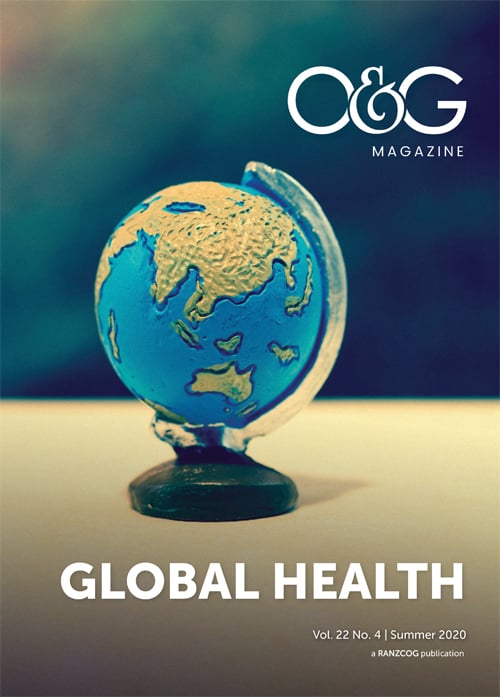What is respectful maternity care and why is it important?
Respectful maternity care is a critical but often neglected area of quality healthcare. Respectful maternity care is defined as ‘… care organised for and provided to all women in a manner that maintains their dignity, privacy and confidentiality, ensures freedom from harm and mistreatment and enables informed choice and continuous support during labour and childbirth.’1 Yet the reality for many women is much different, with disrespectful and undignified care common in many health settings globally.
Among health professionals there is growing awareness of the importance of respectful maternity care. The realisation that respectful care is both a healthcare practice as well as a rights-based issue has helped to inform the understanding that that the provision of clinical care is only one arm of quality care. The other being the experience of care. Care which is kind, respectful and dignified is not an ‘optional extra’, it is an inextricable component of quality maternity care.2
The universal rights of childbearing women* speak to the intersection of respectful maternity care and human rights:
- Freedom from harm and ill treatment
- Right to information, informed consent and refusal and respect for choices and preferences including companionship during maternity care
- Confidentiality and privacy
- Dignity, respect
- Equality, freedom from discrimination, equitable care
- Right to timely healthcare and to the highest attainable level of health
- Liberty, autonomy, self-determination and freedom from coercion3
In our busy professional lives, this might be the point where it can be tempting to cognitively ‘tick the box’ answering ‘yes, I do that, good, what’s the next article?’ We’d like to encourage you to stick with us, we believe there’s something in this for all of us, whether you’ve been practicing for a little or a long time.
What is the problem?
A recent systematic review by Bohren and colleagues presented an evidence-based typology of the mistreatment of women during childbirth which can be a result of human and/or systemic failures.4 Practices that disrespect and mistreat childbearing women are a violation of women’s fundamental human rights;5 are directly related to poor maternal and neonatal outcomes; result in women being less likely to present to the same service for follow up or future care needs6 and are associated with psychological distress in women.7 The typology of the mistreatment of women during childbirth can be categorised into seven main classifications:
- Physical abuse – includes the use of force or physical restraint
- Sexual abuse – includes rape
- Verbal abuse – includes harsh language, threats and blaming
- Stigma and discrimination – based on sociodemographic characteristics, medical conditions
- Failure to meet professional standards of care – lack of informed consent and confidentiality, physical examinations and procedures, neglect and abandonment, coercion
- Poor rapport between women and providers – includes a loss of autonomy, ineffective communication, lack of supportive care
- Health system conditions and constraints – includes lack of resources, policies and facility culture
It should be noted that these mistreatment practices are not a consequence of providing maternity care in resource-constrained environments. Evidence confirms that maternal abuse occurs in all sectors, including low-, middle- and high-income countries, which means that this truly is a global issue.8 9 10 A multi-country study which involved more than 2000 birth observations and community surveys in Ghana, Guinea, Myanmar and Nigeria found that over one-third of women experienced physical or verbal abuse, stigma or discrimination during childbirth.11 Research in high-income countries has similarly found that mistreatment during labour and childbirth is unfortunately commonplace. Indigenous women, women of colour, women who are asylum seekers or refugees, single women, adolescent girls and those who are experiencing homelessness are disproportionately likely to experience disrespectful maternity care.12
A recent report into human rights violations in pregnancy, birth and postpartum during the COVID-19 pandemic lists sobering accounts of women being separated from their babies, not allowed access to support people, women being subjected to forced medical intervention and denied access to decentralised community based care.13 Unfortunately, the reality is that we haven’t needed a pandemic for these transgressions of rights to occur, they were commonplace well before COVID-19. Anecdotal reports are plentiful and evidence documents where women in Tanzania have been hit and yelled at during labour; women in Brazil deprived of skin-to-skin contact with their babies after birth;14 women in Australia denied access to vaginal birth after a previous caesarean,15 women in Canada being coerced into unnecessary interventions because the hospital needs beds for more women;16 women in Nigeria subjected to vaginal examinations without consent,17 women in New Zealand denied the right to privacy with pressure to accept medical students lined up to observe vaginal examinations, the list is long and compelling.
The drivers of mistreatment of women during pregnancy and childbirth are complex and involve people and systems. The cause for hope is that both of these are modifiable agents. There is no one profession or group of people identified as the source of the mistreatment. This means that we are all responsible both collectively and individually to challenge mistreatment where we see it happen in our workplaces. Bringing it closer to home where we can really affect change is to have the bravery to reflect on our own practice, asking ‘how I can modify the way I engage with women to ensure respectful maternity care?’ Even perhaps, ‘how can I inspire it in my colleagues?’ Remembering that respectful maternity care is a fundamental and necessary component of quality maternity care.
The second identified agent of the mistreatment of childbearing women is health systems. The industrialisation of healthcare is no different to the industrialisation of any other sectors, it relies on the systems efficiencies of standardised units.18 Many of us will have encountered cases where a woman’s care is impacted due to systems-based ‘efficiency’ requirements such as where labour is augmented because bed space is needed; or an instrumental birth offered to just help the baby (and staffing) out before a shift change; or women being induced earlier than needed because there’s no space in the induction book next week when it might be more clinically appropriate; Aboriginal women having to fly hundreds of kilometres away from Country and cultural supports because there are no services available to them; clinical consults conducted in less-than-private settings because all the rooms are full; women denied access to labouring in water because ‘we don’t do that here’. We also need to embrace implementation research which centres women’s voices and goes beyond the biomedical, encompassing public health and the social sciences to identify effective and feasible interventions to improve respectful maternity care.
Both the women to whom care is provided and the professionals providing the care are anything but ‘standardised units.’ We each hold unique values and beliefs that intersect with our cultural, social and spiritual influences. Industrialisation relies on the commodification of humans where we are but one more ‘link in the chain’ of systems efficiencies. Whilst there is evidence and recognition of the negative impact of systems-centred care on women, another consequence is vicarious trauma to the health professionals who are required to provide care in these constrained systems. Rates of burnout and psychological distress are climbing among obstetricians and midwives.19 20 Calls for ‘professional resilience’ are being challenged in the context of the dehumanising outcomes of systems-centred care for both the consumers and providers of healthcare.
What can we do?
There are some tangible ways that we can address the barriers to respectful maternity care that will not only result in quality care for women but quality, rewarding work environments for all health practitioners.
The first step is individual awareness of the ways that respectful maternity care could be implemented or enhanced within our own practice. Confronting unconscious bias where we have been conditioned to align with systems-based priorities rather than providing respectful, woman-centred care is both challenging and important. This level of critical appraisal of our own practice requires bravery but is necessary in order to effect change at a broader level. Supporting respectful maternity care in our colleagues’ work is also an important step to reinforcing positive change in the clinical environment which improves maternal and newborn outcomes and also leads to increased work satisfaction.21 22
Provoking change in well-established hierarchical maternity systems might seem an even greater challenge than individual change but the reality is, it can, and must, be done. There have been swift and radical changes to maternity care in the past year in response to the global COVID-10 pandemic. It is timely to consider and seize the opportunity to create the systems that will support us well into the future by examining how we can construct frameworks that will support respectful maternity care.23 24
Providing respectful, woman-centred maternity care is quite literally the way to change the world. The realisation of practices and systems that uphold women’s human rights will bring justice and equity long overdue to women around the world. Remembering the privilege that it is to work with women in this most fundamental of human acts of giving birth serves as the impetus to ensure that the respectful, quality maternity care that we provide will result in better outcomes for all women and their babies. When we improve outcomes and quality of care for mothers, we improve the health of families, communities, society and our world – one woman at a time.
* Inclusivity Statement: We recognise that individuals have diverse gender identities. Terms such as pregnant person, people who give birth and parent are sometimes used to avoid gendering birth, and those who give birth, as feminine. However, globally many women are also marginalised and oppressed, as such, we have continued to use the terms woman, mother or maternity. When we use these terms, it is not meant to exclude those who give birth and do not identify as women.
References
- WHO. WHO recommendation on respectful maternity care during labour and childbirth. Geneva: World Health Organization; 2018.
- Miller S, Abalos E, Chamillard M, et al. Beyond too little, too late and too much, too soon: a pathway towards evidence-based, respectful maternity care worldwide. The Lancet. 2016;388(10056):2176-92.
- WHO. Respectful Maternity Care: The Universal Rights of Childbearing Women. Washington DC: The White Ribbon Alliance, World Health Organization; 2018. https://www.who.int/woman_child_accountability/ierg/reports/2012_01S_Respectful_Maternity_Care_Charter_The_Universal_Rights_of_Childbearing_Women.pdf
- Bohren MA, Vogel JP, Hunter EC, et al. The Mistreatment of Women during Childbirth in Health Facilities Globally: A Mixed-Methods Systematic Review. PLOS Medicine. 2015;12(6):e1001847. https://journals.plos.org/plosmedicine/article?id=10.1371/journal.pmed.1001847
- WHO. Respectful Maternity Care: The Universal Rights of Childbearing Women. Washington DC: The White Ribbon Alliance, World Health Organization; 2018. https://www.who.int/woman_child_accountability/ierg/reports/2012_01S_Respectful_Maternity_Care_Charter_The_Universal_Rights_of_Childbearing_Women.pdf
- Bohren MA, Vogel JP, Hunter EC, et al. The Mistreatment of Women during Childbirth in Health Facilities Globally: A Mixed-Methods Systematic Review. PLOS Medicine. 2015;12(6):e1001847. https://journals.plos.org/plosmedicine/article?id=10.1371/journal.pmed.1001847
- Patterson J, Hollins Martin C, Karatzias T. PTSD post-childbirth: a systematic review of women’s and midwives’ subjective experiences of care provider interaction. Journal of Reproductive and Infant Psychology. 2019;37(1):56-83.
- Bohren MA, Vogel JP, Hunter EC, et al. The Mistreatment of Women during Childbirth in Health Facilities Globally: A Mixed-Methods Systematic Review. PLOS Medicine. 2015;12(6):e1001847. https://journals.plos.org/plosmedicine/article?id=10.1371/journal.pmed.1001847
- Morton CH, Henley MM, Seacrist M, Roth LM. Bearing witness: United States and Canadian maternity support workers’ observations of disrespectful care in childbirth. Birth. 2018;45(3):263-74.
- Newnham E, Page L. Humanisation of childbirth 1. The humanisation of childbirth. The Practising Midwife. 2019;22(11).
- Bohren MA, Mehrtash H, Fawole B, et al. How women are treated during facility-based childbirth in four countries: a cross-sectional study with labour observations and community-based surveys. The Lancet. 2019;394(10210):1750-63.
- Vedam S, Stoll K, Taiwo TK, et al. The Giving Voice to Mothers study: inequity and mistreatment during pregnancy and childbirth in the United States. Reproductive Health. 2019;16(1).
- HRIC. Human Rights Violations in Pregnancy, Birth and Postpartum during the COVID-19 Pandemic. San Francisco: Human Rights in Childbirth; 2020. https://humanrightsinchildbirth.org
- Silva ALAD, Mendes ADCG, Miranda GMD, Souza WVD. Quality of care for labor and childbirth in a public hospital network in a Brazilian state capital: patient satisfaction. Cadernos de Saúde Pública. 2017;33(12).
- Jenkinson B, Kruske S, Kildea S. The experiences of women, midwives and obstetricians when women decline recommended maternity care: A feminist thematic analysis. Midwifery. 2017;52:1.
- Morton CH, Henley MM, Seacrist M, Roth LM. Bearing witness: United States and Canadian maternity support workers’ observations of disrespectful care in childbirth. Birth. 2018;45(3):263-74.
- Bohren MA, Mehrtash H, Fawole B, et al. How women are treated during facility-based childbirth in four countries: a cross-sectional study with labour observations and community-based surveys. The Lancet. 2019;394(10210):1750-63.
- Szreter S. Industrialization and health. British Medical Bulletin. 2004;69(1):75-86.
- Smith RP. Burnout in Obstetricians and Gynecologists. Clinical Obstetrics and Gynecology. 2019;62(3):405-12.
- Suleiman-Martos N, Albendín-García L, Gómez-Urquiza JL, et al. Prevalence and Predictors of Burnout in Midwives: A Systematic Review and Meta-Analysis. International Journal of Environmental Research and Public Health. 2020;17(2):641.
- Fenwick J, Sidebotham M, Gamble J, Creedy DK. The emotional and professional wellbeing of Australian midwives: A comparison between those providing continuity of midwifery care and those not providing continuity. Women Birth. 2018;31(1):38-43.
- Robson S, Cukierman R. Burnout, mental health and ‘wellness’ in obstetricians and gynaecologists: Why these issues should matter to our patients – and our profession. ANZJOG. 2019;59(3):331-4.
- Page L, Newnham E. Humanisation of childbirth 8: Where do we go from here? The Practising Midwife. 2020;23(4).
- Bohren MA, Tunçalp Ö, Miller S. Transforming intrapartum care: Respectful maternity care. Best Practice & Research Clinical Obstetrics & Gynaecology. 2020;67:113-26.







Leave a Reply